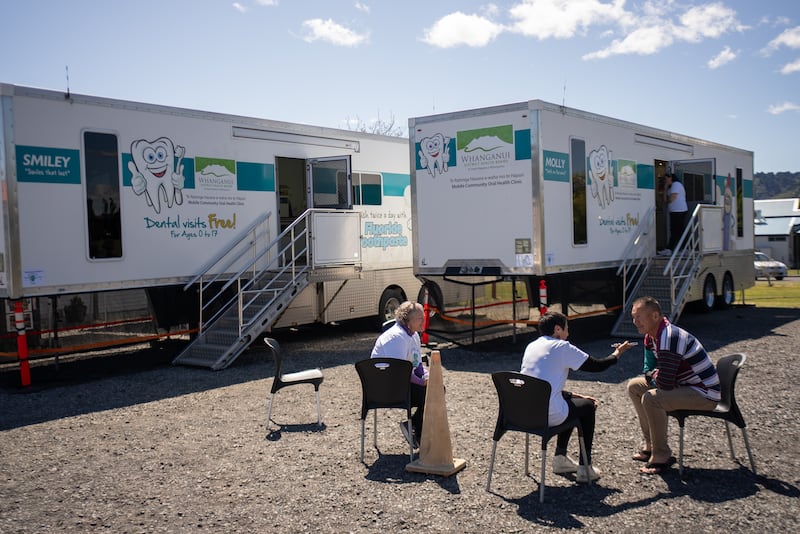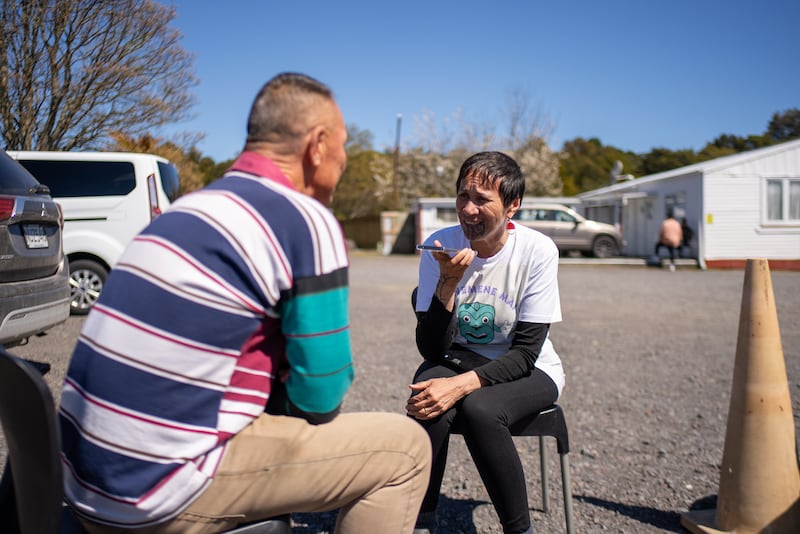Whānau will have access to a free mobile dental clinic in Whanganui this weekend after a successful outing in Ohakune last week.
“It’s going to be a really critical event for whānau to come and have checkups or come because they’ve been in pain for a long time, can’t afford to go and see a dentist - possibly a little bit whakama, when you look at the state of their teeth and their mouth,” says Te Oranganui Trust spokesperson Wheturangi Walsh-Tapiata.
“The other thing that often occurs, particularly for people from rural communities, is transportation is a really big issue.
“So, we’re really looking forward to it, really excited.”
The clinic will be based at Te Kura Kaupapa Māori o Tupoho, at 18 Cross Street, Castlecliff, from Friday through Sunday.
‘Blown away by people’s stories’
Ngāti Rangi, the NZ Defence Force and the iwi-led health and social services provider are collaborating on the initiative funded by Te Whatu Ora.
“Last weekend, we ran three days in the northern part of our region in Ohakune, which covered all of those rural and small communities.
“We had nearly 150 people who received some form of contact with us, whether that was sitting in the seat with a dentist or hygienist, or were referred, the whole range of things.
“We were really blown away by hearing people’s stories about their inability to access dental health care and the consequences of that - for one, their oral health, and two, their overall health.”

The second part of the event starts in Whanganui today.
“We anticipate a repeat of what happened in Ohakune because we have really accessed our own Māori communities, our own iwi Māori providers, and our own whānau to encourage people to come and have a free oral check up or a free oral appointment.”
It is anticipated that the Whanganui turnout will be even greater than it was in Ohakune, where there were four dental chairs in use.
“We will have up to six chairs running, which means we can cater for a bigger population.
“We’re also catering more for those iwi who are in the bottom part of our region, our Wairiki, Ngāti Apa, Tupoho, Tama Ūpoko, Ngā Rauru [people].”
‘Strengthens relationships with Māori’ - NZDF
The NZ Army, which is helping facilitate the free dental clinics, was kept busy at last weekend’s clinic in Ohakune, where they saw more than 100 people, extracted 125 teeth and gave 40 fillings.
“We had about 12 army personnel provided to the activity, and those were a mixture of our regular force, our reserve force personnel, and a couple of our civilian dental staff and support staff,” says Colonel Anthony Blythen, NZDF Commander of the Joint Support Group.
“We treated approximately 112 people, and that was a mixture of checking, cleaning, some extractions and some fillings. And we’re expecting to be able to do a similar number of people during the activity in Whanganui this weekend.”
Colonel Blythen says the NZDF values the opportunity to assist and strengthen their relationships with Māori communities.
“We do have Māori personnel within our dental core, and in particular in relation to this [initiative].
“Our relationships and partnerships with iwi and communities are continually strengthened by activities such as this. And it’s great to be able to work together for the betterment of the whole community.
“So it’s a really good opportunity for us.”

‘Big job’ to improve Māori oral health
Walsh-Tapiata says there is a lot of work to be done to improve Māori oral health and she hopes this initiative can be continued in future.
“I never really knew how significant this was until I attended the event last weekend. We’ve been gathering whānau interviews before and after they go in for their appointments.
“It was incredibly humbling to hear the stories of our whānau,” she says.
“There’s a really big job to do in terms of education with our whānau.
“I just think that we as Māori whānau don’t truly understand the impact of oral health on our wider health, and I think in recent years we’ve become a lot more aware of that.
“Whānau were turning up, and they were saying I know that now but it’s too late for my mouth.
“The unfortunate thing is because oral health, particularly after the age of 18 is primarily private, our whānau aren’t accessing those services.
“Who best to support them to access those services than the likes of our iwi Māori hauora providers who have formed great relationships with others who are supporting this kaupapa.”



